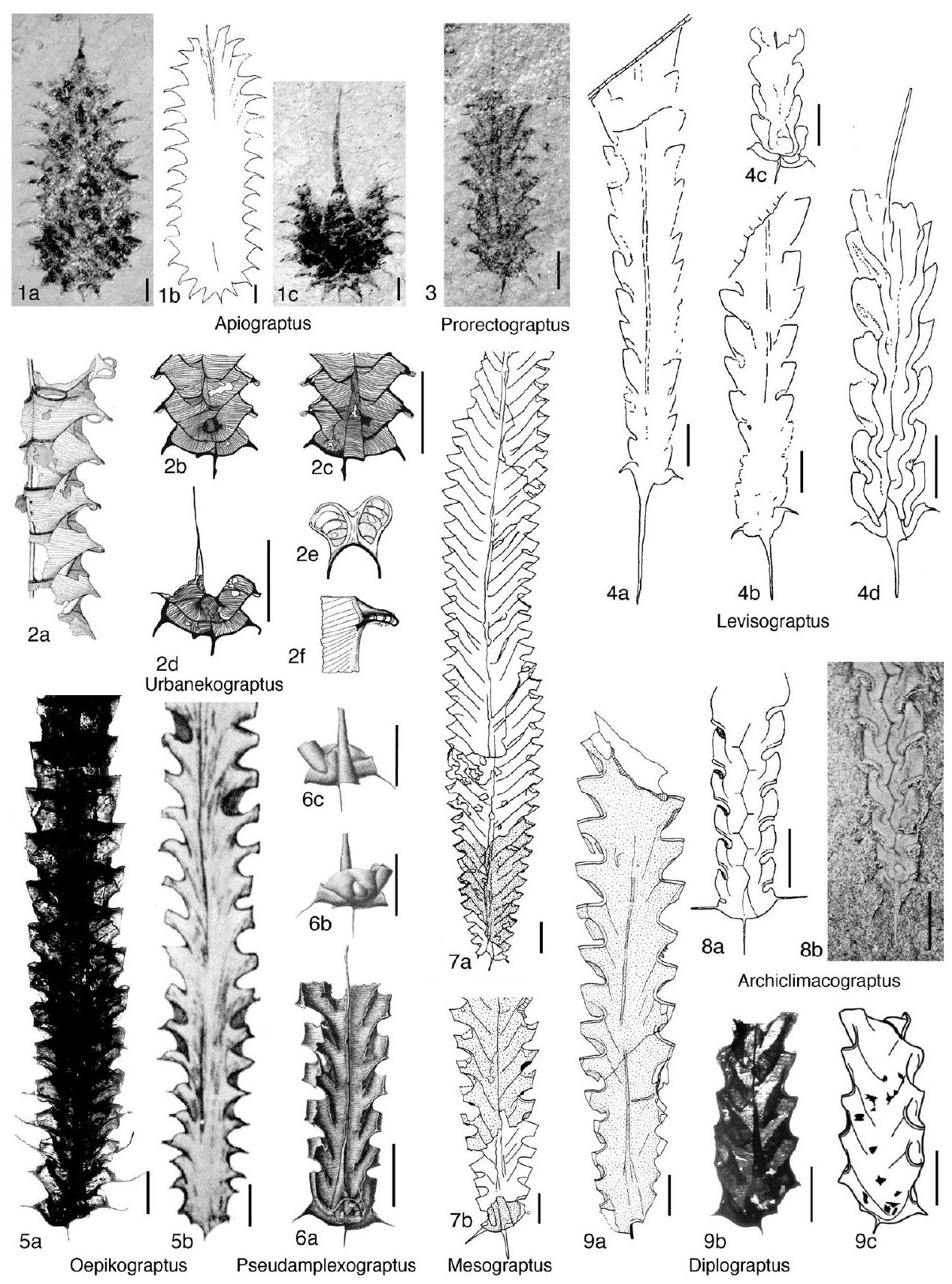Welcome to the Treatise on Invertebrate Paleontology!
Please enter a genera name to retrieve more information.

Pseudamplexograptus
Classification
Phylum:
Hemichordata
Class:
Pterobranchia
Subclass:
Graptolithina
Order:
Graptoloidea
Suborder:
Axonophora
Infraorder:
Diplograptina
Family:
Diplograptidae
Subfamily:
Diplograptinae
Formal Genus Name and Reference:
Pseudamplexograptus MITCHELL, 1987, p. 389
Type Species:
*Lomatoceras distichum Eichwald, 1840, p. 101, OD (lectotype illustrated by JAANUSSON, 1960, pl. $5, 5)
Images
(Click to enlarge in a new window)
Fig. 229,6a-c. * P. distichus (Eichwald) isolated specimens, Öland, Sweden, 6a, NRM-PZ Cn 2355, 6 b-c, NRM-PZ 111 (Holm collection), juvenile in reverse ( b ) and obverse ( c ) views, showing pattern C astogeny (Bulman, 1932a, pl. 4,19-20, pl. 5,1, respectively). Scale bars, 1 mm
Synonyms
Geographic Distribution
UK, Estonia, Latvia, Sweden, Norway, China, Russia
Age Range
Beginning Stage in Treatise Usage:
Middle Ordovician (upper Darriwilian, Pseudamplexograptus distichus Biozone)
Beginning International Stage:
Darriwilian
Fraction Up In Beginning Stage:
50
Beginning Date:
463.8
Ending Stage in Treatise Usage:
Middle Ordovician (upper Darriwilian, Pseudamplexograptus distichus Biozone)
Ending International Stage:
Darriwilian
Fraction Up In Ending Stage:
100
Ending Date:
458.18
Description
Diplograptines with broad and nearly parallel-sided tubarium, thecae geniculate throughout or geniculum lost distally, thecal excavations deep and semicircular to somewhat restricted, apertures horizontal to introverted, supragenicular wall short and commonly of similar height to that of thecal excavations, pattern C astogeny with early origin of th $3^{1}$, dicalycal theca th $2^{1}$ with complete median septum and intrathecal folding, first thecal pair with apertural or subapertural spines
References
Mitchell, C. E. 1987. Evolution and phylogenetic classification of the Diplograptacea. Palaeontology 30(2):353-405.
Museum or Author Information
Classification
Phylum:
Hemichordata
Class:
Pterobranchia
Subclass:
Graptolithina
Order:
Graptoloidea
Suborder:
Axonophora
Infraorder:
Diplograptina
Family:
Diplograptidae
Subfamily:
Diplograptinae
Formal Genus Name and Reference:
Pseudamplexograptus MITCHELL, 1987, p. 389
Type Species:
*Lomatoceras distichum Eichwald, 1840, p. 101, OD (lectotype illustrated by JAANUSSON, 1960, pl. $5, 5)
Images
(Click to enlarge in a new window)
Fig. 229,6a-c. * P. distichus (Eichwald) isolated specimens, Öland, Sweden, 6a, NRM-PZ Cn 2355, 6 b-c, NRM-PZ 111 (Holm collection), juvenile in reverse ( b ) and obverse ( c ) views, showing pattern C astogeny (Bulman, 1932a, pl. 4,19-20, pl. 5,1, respectively). Scale bars, 1 mm
Synonyms
Geographic Distribution
UK, Estonia, Latvia, Sweden, Norway, China, Russia
Age Range
Beginning Stage in Treatise Usage:
Middle Ordovician (upper Darriwilian, Pseudamplexograptus distichus Biozone)
Beginning International Stage:
Darriwilian
Fraction Up In Beginning Stage:
50
Beginning Date:
463.8
Ending Stage in Treatise Usage:
Middle Ordovician (upper Darriwilian, Pseudamplexograptus distichus Biozone)
Ending International Stage:
Darriwilian
Fraction Up In Ending Stage:
100
Ending Date:
458.18
Description
Diplograptines with broad and nearly parallel-sided tubarium, thecae geniculate throughout or geniculum lost distally, thecal excavations deep and semicircular to somewhat restricted, apertures horizontal to introverted, supragenicular wall short and commonly of similar height to that of thecal excavations, pattern C astogeny with early origin of th $3^{1}$, dicalycal theca th $2^{1}$ with complete median septum and intrathecal folding, first thecal pair with apertural or subapertural spines
References
Mitchell, C. E. 1987. Evolution and phylogenetic classification of the Diplograptacea. Palaeontology 30(2):353-405.
